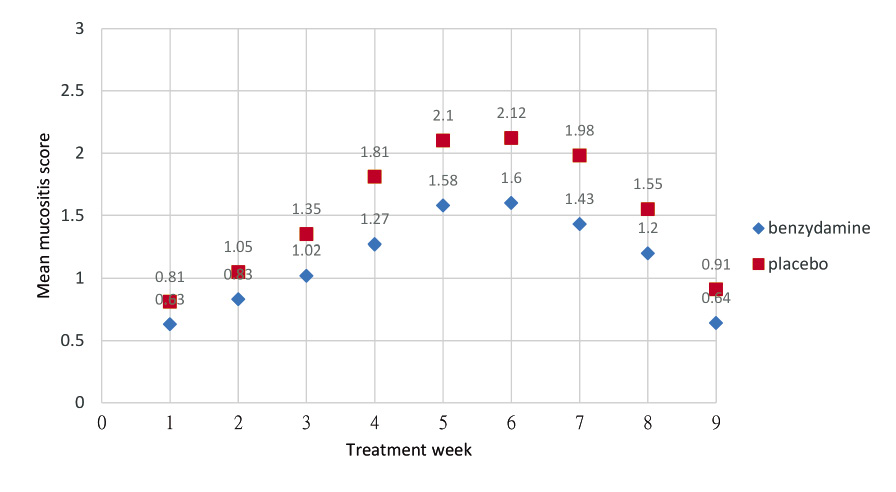摘要
黏膜炎為繼發於癌症治療的黏膜損傷,受損範圍包含咽、喉、食道及胃腸道等。黏膜炎主要由放射治療和 (或) 化學治療引起。對於頭頸部癌症病人,口腔黏膜炎是放療之主要副作用之一,而使用化療藥如5-flurouracil (5FU) 及 methotrexate 也會發生,放療結合化療將增加其發生率及嚴重度,其嚴重度與化學治療計畫所使用藥物及劑量有關。口腔黏膜之發炎及疼痛減少患者進食食慾、降低病人之生活品質,並進而增加感染之風險。
治療黏膜炎以症狀緩解為主要治療方針,包含口腔照護、局部黏膜保護劑及局部或全身性的止痛藥,其中 Benzydamine 為非類固醇類抗發炎藥物,可抑制前發炎性細胞激素如介白素 (interleukin-1β) 與腫瘤壞死因子 (tumor necrosis factor-α) 生成,MASCC/ISOO 治療指引 (2014) 中建議使用 benzydamine 漱口水可預防頭頸部癌症之口腔黏膜炎 (接受放射治療劑量 < 50 Gy,不同時使用化療)。
本研究探討在接受放療和 (或) 化療之頭頸部癌症病人利用 benzydamine 緩解其口腔黏膜炎症狀及降低使用較高放療劑量 (> 50 Gy) 之口腔黏膜炎發生率之效果。
在文獻收集及評讀後所得的結論為 Benzydamine 可減緩接受放療之頭頸部癌症病人口腔黏膜炎之症狀及嚴重度,也能降低使用較高放療劑量 (> 50 Gy) 頭頸部癌症病人之口腔黏膜炎發生率。
關鍵字: stomatitis、oral mucositis、cancer、benzydamine
壹、前言
癌症病人接受放射治療與化學治療後,可能會有全身性或局部黏膜發炎 (mucositis) 或潰瘍之副作用,常見黏膜範圍包括腸胃道 (gastrointestinal mucositis) 及口腔 (stomatitis),主要造成嘴巴痛、破皮、吞嚥困難1,2,進而影響病人的進食、營養攝取及生活品質。許多化學治療藥品會有黏膜炎之副作用2,如 alkylating agents (cyclophosphamide)、anthracyclines (daunorubicin, doxorubicin)、antimetabolites (5-fluorouracil, methotrexate)、taxanes (docetaxel, paclitaxel) 及 topoisomerase inhibitors (etoposide, irinotecan) 等。
根據 MASCC/ISOO clinical practice guideline (2014) 對於癌症病人接受癌症治療後產生 mucositis 副作用時之治療建議指出3:治療口腔黏膜炎以止痛為主,如全身性或局部使用 morphine, fentanyl;而預防口腔黏膜炎的方式包含冷凍治療 (cryotherapy)、人類角質形成細胞之生長因子 (keratinocyte growth factor-1, palifermin)、以低劑量放射線治療癌症、benzydamine 漱口水、加強口腔照護等。其中 benzydamine 具有麻醉、止痛及消炎作用,用於治療口腔黏膜炎,是否能有效緩解其症狀?若將其應用於預防較高劑量放射線治療,並同時接受化療者,所引起之口腔黏膜炎,是否能夠降低口腔黏膜炎之發生率嗎?本篇依據實證醫學的方法,查詢文獻並評讀,以期能夠得到明確的結論並對於臨床治療提供適切建議。
貳、方法
應用實證醫學的方法,以 stomatitis, cancer 為關鍵字搜尋文獻,使用其同義字及 MESH terms,依6S pyramid (systems, summaries, synopses of syntheses, syntheses, synopses of studies, studies) 分層搜尋文獻,實證醫學資料庫包含 National Guidelines Clearinghouse, Uptodate, ACP journal club, Cochrane Library, Pubmed 及華藝線上圖書館,判斷文獻之證據等級,以適當評讀工具進行評讀,提供醫療人員確切證據,作為臨床應用之參考。
參、結果及討論
查詢實證醫學資料庫過程,由二級文獻 Cochrane library systemic review (2010) 對於癌症病人接受放/化療後的口腔黏膜炎之介入建議4,歸納數個 randomised controlled trials (RCT) 研究,目的為了解不同治療方式用於癌症病人接受放療、化療或兩者皆有之口腔黏膜炎的效果,觀察結果包含口腔黏膜之癒合時間、吞嚥疼痛控制、住院治療時間、治療成本及改善生活品質等指標。
其中有兩篇文獻 Kim (1985), Schubert (1987) 分析 benzydamine 與安慰劑改善口腔黏膜炎之治療效果5,6,使用 benzydamine 及安慰劑於統計學上沒有顯著差異 risk ratio (RR) 1.22 (95% confidence interval (CI) 0.94 to 1.60)。Kim (1985) 因未完整收錄所有接受試驗病人之結果 (60%) 而較具爭議性;在 Schubert (1987) 這篇指出,若增加其試驗人數,則能夠提高 benzydamine 及安慰劑效果之差異性。
為了解2010年後是否有文獻進一步研究 benzydamine 使用於癌症病人之口腔黏膜炎的相關副作用,於 Pubmed 搜尋,並以年代、臨床試驗作為篩選條件,結果有一篇刊登於 Asia-Pacific Journal of Clinical Oncology (2015) 之 RCT 研究符合搜尋條件7,依評讀工具去判斷其在臨床應用之可行性。此為隨機分配之雙盲試驗,受試病人在實驗組 (benzydamine oral rinse) 及安慰劑組 (placebo) 之起始條件在統計學上無顯著差異,實驗以外之醫療介入是相同的,如放療前的評估、放療後一週、試驗結束後的兩週均有記錄治療範圍、使用之放射劑量、治療期間及是否有停止治療,又以0-3分作為口腔黏膜炎之評估分級,本篇文獻以潰瘍範圍大小作為分級依據不同於 NCI CTCAE 口腔黏膜炎分級 (表一),文章提及試驗第6週時,實驗組及安慰劑組皆有部分病人離開試驗,原因有 neutropenic fever 及 severe mucositis,它們未被收錄至最後的結果,其 drop-out rate 為17%,本篇未使用信賴區間評估以 benzydamine 治療口腔黏膜炎之療效,僅以 P value 分析實驗組及安慰劑組平均口腔黏膜炎分數 (mean mucositis score) 是否有顯著差異 (圖一),在第1-3週沒有顯著差異,但是在第4-7週實驗組之 mean mucositis score 明顯低於安慰劑組,P value = 0.01統計學上有顯著差異,即使用benzydamine 的病人口腔黏膜炎能夠降低嚴重度,如果第4-7週後 mean mucositis score 延續此趨勢,那麼安慰劑組的 mean mucositis score 會是較高的。
表一 NCI CTCAE 第四版口腔黏膜炎與相關文獻之分級比較3,7


*治療第一週-第三週:P-value 不具顯著差異
*治療第四週-第七週:P-value = 0.01
*放射治療後第一週及第二週:P-value 不具顯著差異
圖一 治療期間之平均黏膜炎分數 (Mean mucositis score, MMS) 變化7
MASCC/ISOO clinical practice guideline (2014) 建議 benzydamine oral rinse 用於預防以中等劑量放射治療 (< 50 Gy) 之頭頸癌病人所引起之口腔黏膜炎3,若以較高劑量的放射治療 (> 50 Gy) 則 benzydamine 之預防效果又是如何呢?在2016年的一篇文獻研究是 benzydamine 用於預防頭頸癌病人之放/化療副作用 (口腔黏膜炎),其中放射線治療之劑量 > 50 Gy8,此為一非盲、預期性、隨機試驗,共有120位病人,分為四組 (A, B, C, D) 其中A組 (29人) 及B組 (33人) 僅接受放射治療;C組 (28人) 及D組 (30人) 接受放射治療及化學治療,A組及C組為試驗控制組 (以食鹽水漱口);B組及D組為實驗組 (以 benzydamine hydrochloride (0.15%) 漱口),試驗內容總述於 (表二)。在 WHO (WHO-M) 及 CTCAE (CTC-M) 分級中,B組病人較少 grade 3,相較於A組,分別是62.1 vs. 36.4% (p = 0.038) 及 51.7 vs. 27.3% (p = 0.043);在使用鼻胃管、以 IV 輸注補充體液及住院的比率中,B組較低於A組,分別是34.5 vs. 21.2%(p = 0.18), 27.6 vs. 9.1%(p = 0.06)及6.9 vs.0%(p = 0.21);而在 WHO (WHO-M) 及 CTCAE (CTC-M) 分級中,C組及D組沒有顯著差異,分別是64.3 vs. 43.3%(p = 0.091) 及 53.6% vs. 43.3%(p = 0.30),使用鼻胃管、以 IV 輸注補充體液及住院的比率較低,但 p > 0.05。
表二 相關文獻之試驗內容8

Benzydamine 之止痛、麻醉作用,可緩解口腔黏膜炎症狀,減輕其嚴重度,又文獻使用劑型為漱口水,在臨床使用上目前有 Benzydamine 噴霧劑型,直接噴於口腔疼痛、紅腫處,使用較為方便;於華藝線上圖書館查得的文獻以口腔照護為主,可作為癌症病人口腔照護之依據。建議以不含酒精成分之漱口水清潔,於晨起、飯後及睡前刷牙,若有配戴假牙則增加假牙照護;均衡飲食並以軟質易吞嚥為主,多攝取高蛋白質,避免辛辣刺激、太乾或過熱的食物。
肆、結論
經搜尋文獻評讀後提供治療建議及臨床照護如下:benzydamine 本身具有抗發炎、止痛、麻醉作用3-6,可減少口腔黏膜炎的發生及嚴重度7,甚至可用於以高劑量放射線 (> 50 Gy) 治療頭頸部癌症之病人,以減少口腔黏膜炎發生、鼻胃管使用率、IV 輸注補充、住院率;而在同時使用放射線治療及化療病人,其應用性仍有進一步探討的需求8。
目前臺灣市面上 benzydamine 有噴劑與液劑供選擇,噴劑直接噴於疼痛、紅腫部位,並緩慢吞服,不用再吐出來,液劑則需含漱後吐出,兩者均可有效緩解口腔黏膜炎之症狀,耐受性佳且不良反應較少,常報導的僅為患部麻木 (2.6%),偶而會灼熱及刺痛感。此外,幫助病人建立正確口腔照護觀念,如晨起、飯後、睡前刷牙,選用不含酒精之漱口水等均有助於改善發炎及黏膜癒合,日常生活也應避免刺激性大的食物,並以軟質、易吞嚥食物為主。
Use of Benzydamine for Radiotherapy/chemotherapy-induced Oral Mucositis
Miao-Hua Chang, Wen-Chin Hsu, Yen-Wen Chen, Cheng-Ying Yu, Tang-Chia Chung
Department of Pharmacy, Kaohsiung Medical University Hospital,
Kaohsiung Medical University
Abstract
Mucositis refers to mucosal damage secondary to cancer therapy occurring in the oral cavity; pharyngeal, laryngeal, and esophageal regions; and other areas of the gastrointestinal tract. Mucositis can be caused by chemotherapy and=or radiation therapy. Oral mucositis (OM) is a major limiting acute side effect of radiotherapy for head and neck cancer. OM may also occur with chemotherapeutic agents like 5-flurouracil (5FU) and methotrexate. The incidence of mucositis increases many folds with the use of concurrent chemotherapy. The addition of chemotherapy increases the risk of severe mucositis, and intensity varies with chemotherapeutic regimen and dose.OM affects the patients in a multifactorial manner, causing significant pain, decrease in oral intake, quality of life of patients, and this may be further aggravated by superimposed infections.
Treatment of mucositis is supportive and aimed at symptom control. It consists of a combination of oral care, topical mucosal protectants, and either topical or systemic analgesia. Benzydamine is a nonsteroidal anti-inflammatory drug that can inhibit the production of proinflammatory cytokines such as tumor necrosis factor-α and interleukin-1β. MASCC/ISOO mucositis guidelines(2014) recommends that benzydamine mouthwash be used to prevent oral mucositis in patients with head and neck cancer receiving moderate dose radiation therapy (up to 50 Gy), without concomitant chemotherapy.
The aim of this report is to investigate the efficacy of prophylactic benzydamine in reducing the signs and symptoms of oral mucositis in patients receiving RT with or without chemotherapy for head and neck cancers. Also, the use of benzydamine reduces the rates of OM in patients treated with higher radiation dose (>50 Gy).
Benzydamine can be helpful in reducing the degree of oral mucositis in patients undergoing RT to head and neck area, and in alleviating the symptoms in patients with oral mucositis. It reduces the rates of OM in patients treated with higher radiation doses > 50 Gy and up till 70 Gy.
參考資料:
1.Epstein JB, Thariat J, Bensadoun RJ, Barasch A, et al: Oral complications of cancer and cancer therapy: from cancer treatment to survivorship, CA Cancer J Clin 2012;62(6):400-22.
2. Sonis ST, Elting LS, Keefe D, Peterson DE, et al: Mucositis Study Section of the Multinational Association for Supportive Care in Cancer, International Society for Oral Oncology Perspectives on cancer therapy-induced mucosal injury: pathogenesis, measurement, epidemiology, and consequences for patients, Cancer 2004;100(9 Suppl):1995-2025.
3. Lalla RV, Bowen J, Barasch A, Elting L, et al: Mucositis Guidelines Leadership Group of the Multinational Association of Supportive Care in Cancer and International Society of Oral Oncology (MASCC/ISOO) MASCC/ISOO clinical practice guidelines for the management of mucositis secondary to cancer therapy, Cancer. 2014 May;120(10):1453-61.
4. Jan E Clarkson, Helen V Worthington, Susan Furness, Martin McCabe, et al: Interventions for preventing oral mucositis for patients withcancer receiving treatment, Cochrane Database Syst Rev. 2010 Dec 8;(12):CD000978.
5. Kim JH, Chu F, Houde R: A clinical study of benzydamine for the treatment of radiotherapy-induced mucositis of the oropharynx, International Journal of Tissue Reaction 1985; VII(3):215-8.
6. Schubert MM, Newton RE: The use of benzydamine HCI for the management of cancer therapy-induced mucositis: preliminary report of a multicentre study, International Journal of Tissue Reaction 1987;IX(2):99-103.
7. Sheibani KM, Mafi AR, Moghaddam S, Taslimi F, et al: Efficacy of benzydamine oral rinse in prevention and management of radiation-induced oral mucositis: A double-blind placebo-controlled randomized clinical trial, Asia Pac J Clin Oncol. 2015 Mar;11(1):22-7.
8. Rastogi M, Khurana R, Revannasiddaiah S, Jaiswal I, et al: Role of benzydamine hydrochloride in the prevention of oral mucositis in head and neck cancer patients treated with radiotherapy (>50 Gy) with or without chemotherapy, Support Care Cancer 2017 May;25(5):1439-1443.
通訊作者:鐘堂嘉/通訊地址:高雄市三民區十全一路100號
服務單位:高雄醫學大學附設中和紀念醫院藥劑部藥師/聯絡電話:(O) 07-3121101 ext 7192

